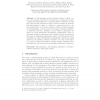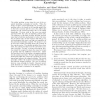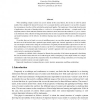1047 search results - page 114 / 210 » Learning the required number of agents for complex tasks |
ATAL
2003
Springer
14 years 1 months ago
2003
Springer
Abstract. A self-organising system functions without central control, and through contextual local interactions. Components achieve a simple task individually, but a complex collec...
SOFSEM
2010
Springer
14 years 4 months ago
2010
Springer
The biggest challenge facing software developers today is how to gracefully evolve complex software systems in the face of changing requirements. We clearly need software systems t...
AAAI
1998
13 years 9 months ago
1998
The utility problem occurs when the cost of the acquired knowledge outweighs its bene ts. When the learner acquires control knowledge for speeding up a problem solver, the bene t ...
CONTEXT
1999
Springer
14 years 5 days ago
1999
Springer
When modelling complex systems one can not include all the causal factors, but one has to settle for partial models. This is alright if the factors left out are either so constant...
IAT
2006
IEEE
14 years 1 months ago
2006
IEEE
The Web consists of a large amount of unstructured information that hardly can be elaborated by automatic agents. In recent years, a considerable number of techniques for informat...



